Business leaders warn Holyrood over ‘layer of uncertainty’ ahead of crunch vote


A “thick layer of uncertainty” would face firms already struggling to deal with the turmoil of Brexit and a possible second independence referendum, the Scottish Retail Consortium has said.
Opposition parties, including the SNP’s regular pro-independence allies the Greens, are warning they will not support the 2018-19 spending plans ,which face a stage one vote before MSPs on Thursday.
Advertisement
Hide AdAdvertisement
Hide AdThis would leave the minority SNP government facing a struggle to get its plans through Holyrood.
Scottish Retail Consortium director David Lonsdale said: “In the current volatile economic and political climate, businesses need as much certainty as possible.
That’s why it’s crucial MSPs take a collegiate approach to ensure a budget which supports economic growth is passed without delay. Robust debate and scrutiny over the coming days is both right and necessary.
“However, any failure to pass a budget in good time would add a thick layer of uncertainty at an already challenging time for many businesses.”
Mr Lonsdale described the budget as “far from perfect”.
But he added: “There is much within the proposed budget retailers can get behind, in particular on business rates, protecting ordinary workers from income tax rises and rejuvenating our town centres.”
The Greens have pledged to vote against the budget over cuts of £250 million to core council budgets as well as a refusal from the government to commit to overhaul the council tax.
The Liberal Democrats say they will vote against because the SNP will not ditch its plans to hold a second independence referendum.
Labour are also refusing to support the budget on the basis of the cuts and the Tories say they will not back it because of the independence issue and income tax. However, it remains unclear if the latter two parties will abstain, which would leave the SNP with the voting strength to get the budget through.
Advertisement
Hide AdAdvertisement
Hide AdScottish Conservative shadow finance secretary Murdo Fraser raised concerns about the widening income tax gap between Scotland and the rest of the UK.
He said: “If the Nationalists want to get their budget through, there is a very easy way of making that happen.
“Listen to the Scottish Conservatives and take a second independence referendum off the table and address the widening tax gap between Scotland and the rest of the UK.”
Liberal Democrat leader Willie Rennie said: “We have also been clear that independence would mean less money for public services. That’s why it needs to be taken off the table for the remainder of this parliament.
“If the SNP park the issue of independence for the rest of this parliament, then we could reach a comprehensive and progressive deal on the budget. As it stands, we will not be voting for the budget at stage one.”
While the six Scottish Green MSPs have backed the minority SNP administration’s budget for the past two years, co-convener Patrick Harvie claimed the “hugely damaging” proposals for the coming year would lead to massive cuts in local services.
If the budget is not passed at the stage one vote on Thursday, the government will be able to bring revised spending plans back before MSPs in an effort to win an agreement.
However, finance secretary Derek Mackay has been speaking to opposition parties in recent weeks and has failed to find consensus so far.
Advertisement
Hide AdAdvertisement
Hide AdBruce Crawford, convener of Holyrood’s finance committee, urged political rivals to support the budget.
Writing on Twitter, he said: “Opposition parties must get behind the SNP Gov #ScotBudget. Opposing it would mean voting down additional spending on our NHS, education, welfare and local services; causing serious disruption & risking unwanted Scottish Parliament election.”
The budget includes an additional £730m investment in health services north of the Border and £180m aimed at boosting attainment in schools, with £5 billion of capital investment including £1.7bn in spending on transport infrastructure and a £50m town centre fund to support struggling high streets.
Meanwhile, tax changes outlined in the plans will increase differences between Scotland and the rest of the UK.
From April, taxpayers south of the Border will only pay income tax at the 40p rate if they earn more than £50,000 a year.
In Scotland, it is proposed people will pay the higher rate of 41p on earnings above £43,430.